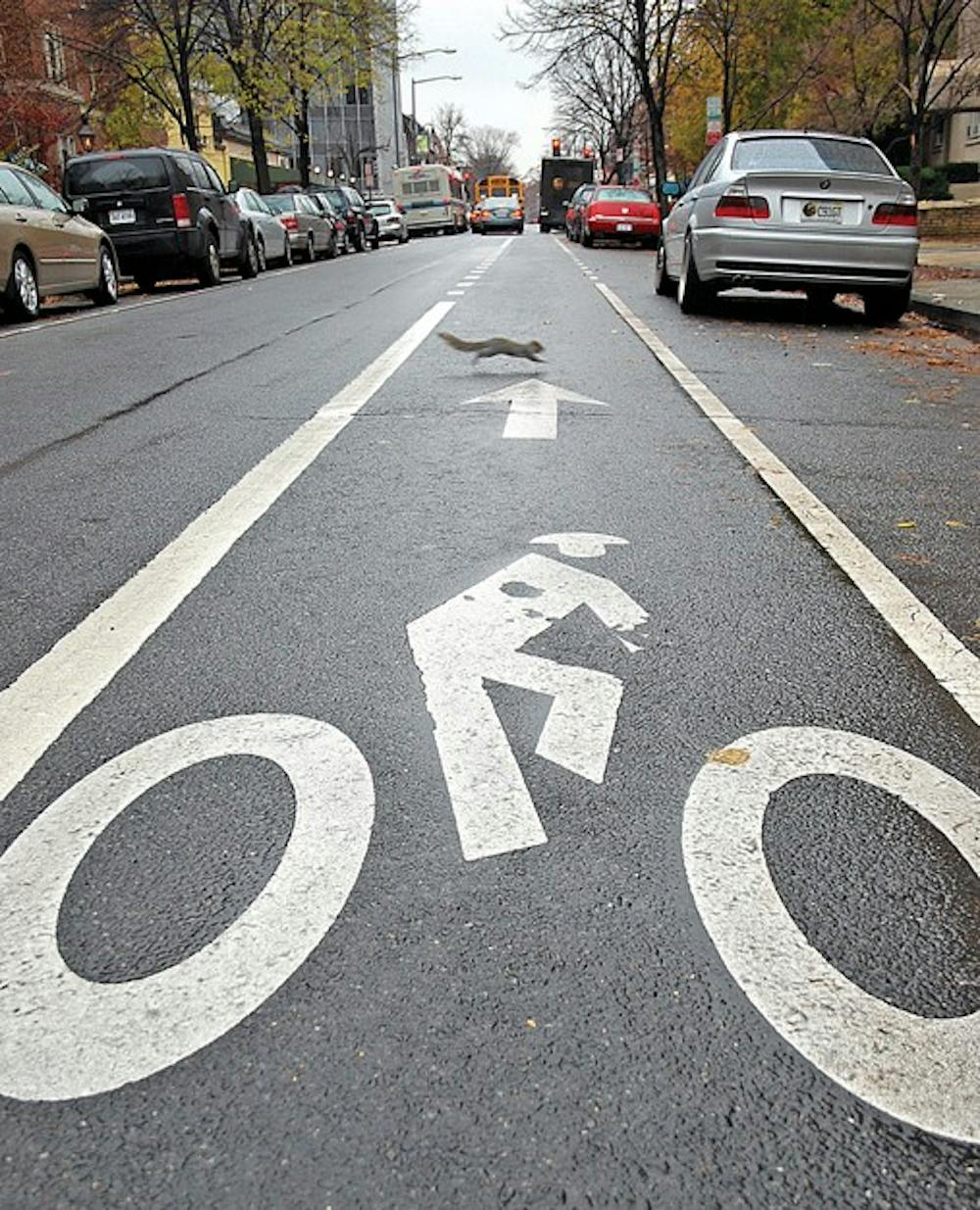In July, three D.C. cyclists were killed in separate accidents. Now the Washington Area Bicyclists Association is demanding the city enact new laws to keep bikers safe.
WABA, which aims to empower cyclists, organized a protest on Aug. 17 to demand enforcement of existing laws and a ban on right turns on red lights, which is set to be voted on by the council in the fall.
As Ward 3 makes an effort to prioritize pedestrians and cyclists, bike safety remains an important issue for AU students and faculty.
As the number of cyclists in D.C. has increased in recent years, the district has taken steps to improve bike safety at the city’s most dangerous intersections and implement bike safety education and incentive programs, like the Capital Bikeshare program.
However, bicycle accidents still remain prevalent in D.C., and safety is a concern to many around AU’s campus and in Ward 3.
“There are definitely times where I know I might get to a location faster if I ride my bike, but choose not to because I feel it’s unsafe,” said Christian Damiana, AU’s former ANC commissioner and current graduate student at AU. Damiana believes AU students often choose not to bike because of safety concerns.
School of Communication Professor Aram Sinnreich bikes about 11 miles to campus everyday on an E-Bike, which has a pedal assist feature to make the long ride more doable. Sinnreich says he doesn’t feel safe biking, but does so to save fossil fuels and for exercise.
“I’ve had acquaintances who died in commuting accidents, and my colleague … was in two different bad bike accidents near campus during her time as a professor here, one of which shattered her elbow,” Sinnreich said. “I’m very aware that the district could do a better job of protecting commuters.”
In April, the Ward 3 D.C. Council vowed to prioritize pedestrian and bicycle safety. The ongoing Nebraska Avenue sidewalk expansion will contribute to making the ride to and from campus safer for cyclists and pedestrians. However, Ward 3 remains the only ward without a real protected bike lane.
“Right now, we’re significantly behind the rest of the city, even though this is an area where a lot of people do ride bikes,” Damiana said. “There have been quite a few new bicycle infrastructure projects over the last year or two … Connecticut [Avenue] and New Mexico [Avenue] are almost certain to happen and the Nebraska sidewalk expansion is almost finished, and then Arizona Avenue is looking pretty likely. So I think we are going to make a lot of strides.”
Damiana acknowledged that Ward 3 is behind other areas of the city in terms of bike safety due to its sparsely populated landscape, as well as the many single family homes within the area. He also noted some neighbors’ tendency to organize against bike lane projects because they don’t see “how it will help them or why it’s necessary.”
When the District Department of Transportation engages in a bike lane project, they also work on pedestrian improvements which usually lead to a comprehensive road redesign to include as many safety mechanisms as possible, Damiana said.
Small changes
Although infrastructure changes like these are necessary to improve bike safety and encourage commuters to cycle, Sinnreich believes the University could encourage biking through small practices.
Sinnreich, who bikes every day in professional clothes that are comfortable for cycling, says the University could further incentivize biking by giving faculty and staff free shower access.
The University has accessible showers in the Don Myers Building and in Spring Valley. Showers are available to building employees in Katzen, the Washington College of Law and the School of International Service, said Jasmine Pelaez, internal communications manager, in an email to The Eagle. Offices on Connecticut Avenue also have showers for building employees, Pelaez wrote.
Sinnreich, who works in the School of Communications, believes these showers should be even more accessible. “That strikes me as a very easy thing that AU could do as an institution to increase the uptake of bike commuting among its community members,” Sinnreich says.
The University offers commuter benefits to faculty and staff. For bikers, this is a $20 voucher every month that they regularly bike to and from campus. The voucher is for the purchase, storage, repair and maintenance of a bicycle. Sinnreich most recently spent his voucher on a bike rack, and says that the initiative encourages him to bike.
“We encourage our staff and faculty members to choose the commuter option that works best for them. Our benefits do aim to make biking a favorable option with a monthly voucher and access to showers on campus,” Pelaez wrote.
Capital Bikeshare also offers a cycling incentive for students, who can get a $25 student membership with unlimited ries for a year. Damiana says that if more students knew about this, more would take advantage of it.
Andrew Useche, a rising junior in the School of Public Affairs, hopes to one day work as a city planner and wants to one day improve bike safety for environmental reasons. Useche commuted using his bike, along with public transportation to his first job in D.C.
“We need to find ways to get biking to be a safe mode [of transportation] throughout more parts of the city so that you can see a higher adoption rate,” Useche said. “The Nebraska sidewalk is a step in the right direction, and I think it’s going to be a very meaningful change.”





